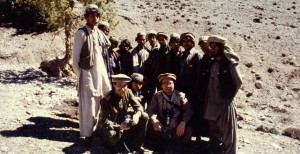The Great Blackout of 2003 came without warning. I was clacking away at my keyboard just wearing shorts because the mercury was high, and when a bead of sweat ran down my temple I decided it was air conditioner time. But before I could even stand to head for the thermostat, my screen went blank and everything went silent. That quiet was the eeriest part–no freezer or fridge hummed, the ballasts on the florescent lights no longer buzzed in the background. My house and my computer had abruptly died.
My first thought was to call my wife–who was off with the kids visiting my mom far out in the suburbs–to tell her not to rush home for dinner. My cell phone couldn’t find a signal–weird since I live downtown. That was my first clue that this was more than a local blackout. The landline worked, but after a quick chat with my wife I discovered the blackout was at least city-wide. Now I was starved for information, so I dug eight C cells out that miraculously had enough charge left to operate a radio and got the next big surprise: static. There wasn’t a single FM channel in operation, but I finally found an AM sports channel that had a working back-up generator, and the radio guy had all the excitement of a sportscaster as he described a multi-state, international blackout. The whole north-east and a chunk of central Canada were suddenly living like it was 1799, except with cars–no traffic lights, just cars. That was the day I learned that an electrical grid is a fragile construction.
Which is why it gets on my nerves when an author of an apocalyptic novel doesn’t understand that. I’ve been reading a lot of them lately, since I write apocalyptic fiction myself, and I’ve been shocked by the ignorance. In Hollowland most of humanity has been overtaken by a zombie plague, but some surviving humans pump gas at a station in the middle of the desert. Uh? Just what’s powering the pump at this gas station? Not electricity that’s for sure.
In another novel, Selection Event, 98% of the planet’s population dies from a flu virus while our lead character, Martin, is underground for a year-long psychology experiment. When Martin comes back to the surface he heads to his parents’ house to see if they survived, and when he gets there he rings the doorbell and it works. What? Everyone died two months ago but the electrical grid is still up?
I tried to suspend my disbelief because areas around Niagara Falls continued to have power during the 2003 blackout thanks to smart power workers who isolated their section of the grid. The Niagara Falls hydro-electric generation plants provide very reliable power.
But in Selection Event Martin discovers from old newspapers that environmentalists had lived long enough to blow up all the dams in the west in order to let “the rivers run free.”
Now if environmentalists lived long enough for tooling around with dynamite, surely nuclear power plant technicians had a little warning too. Despite the Simpsons’ negative portrayal of nuke plant workers, those people actually take their jobs very seriously. If they knew they were all dying of a flu, at the very least they’d put the plants into a safe shutdown mode. Ditto for power plants fired by coal, gas or oil, cause you sure as hell wouldn’t want the explosions that go with unmonitored fossil fuel plants. High pressure steam pipes just can’t be left unattended, and if they are things will go wrong very quickly. These plants aren’t like the Starship Enterprise, which seems to need a massive crew but can be operated just by Captain Kirk in a pinch.
Don’t get me started on solar and wind, because these incredibly variable sources of power are destabilizing for a grid, creating unexpected power surges and deficits as clouds and wind vary. They can’t provide a base load, and if other power sources are gone one surge will trip breakers everywhere on the grid, and there’s no one to reset them.
Now if just knocking one power plant offline could bring down the entire eastern seaboard, image what knocking out dozens of dams, nuke plants, coal and gas plants would do? Hydro is probably the one source of power that could conceivably (although not likely) carry on for a few days without human monitoring, but that would have to be a section of the grid that is not interconnected with the national grid, and in this case the environmentalists had done away with that option.
So if you’re writing an apocalyptic novel, keep in mind that the first thing to go will be the electrical grid, and it will be gone in a matter of hours without human monitoring. Once the power is gone the refineries shut down, so then you gradually lose the gasoline, and well, then it’s back to 1799, only with better guns.

